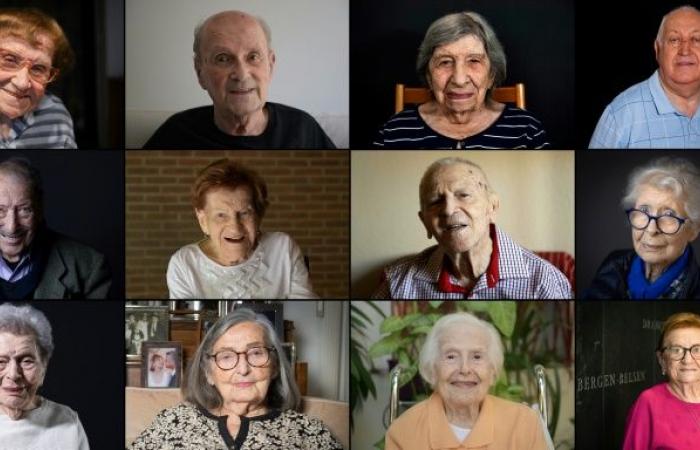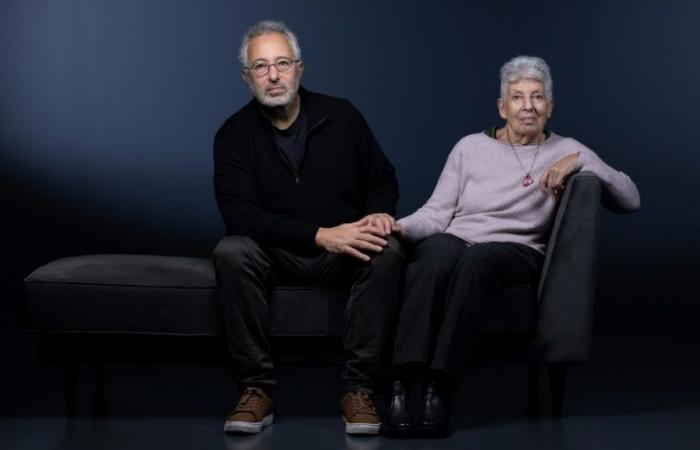They were 15 years old, 4 years old, 7 months old. Some were born there. Auschwitz-Birkenau, Bergen-Belsen, Buchenwald, Ravensbrück. They survived, lived, founded families and intend to pass on, until the end, against oblivion.
For the first or the thousandth time, in the evening of their existence, survivors answered these dizzying questions: what should be said about their deportation, what were they able to transmit, what will become of this memory when they have disappeared, what are their fears and hopes for those who will live after them?
Eighty years after the liberation of Auschwitz-Birkenau, symbol of absolute Evil, around forty survivors of internment, concentration and extermination camps, in around fifteen countries and on four continents, agreed to meet the AFP teams between November 2024 and January 2025.
In Israel, the United States and Canada, France, Poland, Hungary, Romania or Germany, Argentina, Chile or Mexico, South Africa, they posed in front of photographers and videographers. At home or in the studio, alone in front of the camera, surrounded by their children, grandchildren, great-grandchildren or in front of walls covered with photos of their descendants, their victory.
Deported between the ages of 4 and a half and six years in the camps of Vught and Westerbork (Netherlands) then Bergen-Belsen (Germany), the Frenchwoman Evelyn Askolovitch, 86 years old, invokes this imperative to speak because, says -she, “I am part of the very last generation”.
Capture while there is still time the faded faces, the stained hands, the vivid looks of those who saw what the rest of humanity can only imagine with fear. Listen to the story of these incredible destinies, the scattered memories, the quivering of voices, the lost ways too when old age, little by little, eats away their memory.
Vacillating sentinels who have been questioning since 1945. “How could the world allow Auschwitz?”, asks Marta Neuwirth, 95 years old, born in Hungary, deported at the age of 15 in Santiago, Chile. large death camp located in Poland then occupied by the Nazis.

“Every time I think about the Holocaust, the first thing that comes to mind is my twin sister,” confides Canadian Pinchas Gutter, 92, born in Poland, first deported to Majdanek (in occupied Poland). As soon as he arrived in this “apocalyptic hell”, the 11-year-old child that he was was separated from Sabrina.
His only memory of her is “the blonde braid” she wore while running towards their mother. “Her magnificent blonde braid,” he repeats, the luminous look in his eyes that hides his immeasurable sorrow so well. “I have forgotten everything about her (…) Not having the slightest memory of her, knowing what she looked like, just this braid, that hurts me extremely.”
In Buenos Aires, Pedro Polacek, 88 years old, born in Prague, deported at the age of six to Theresienstadt (Czech Republic) clings to the memory of his murdered father. “What he taught me before we were deported: he taught me how to face life.”

It is the strength of her mother that Israeli Eva Erben, 84, born in Prague, deported to Theresienstadt and Auschwitz-Birkenau, evokes. “She would talk to me about what we would do when we got home, what we would buy, what shoes we would have, what clothes and we would go visit people, get our teeth fixed.”
“A heroine,” she continues, who died after “the Death March” when, as Soviet soldiers approached, the Nazis forced the deportees to travel hundreds of kilometers, in rags, in the snow and cold. freezing, towards Germany and Austria.
Return of anti-Semitism, fear of oblivion
Eighty years later, have their testimonies been useful? These last survivors confided to AFP the anguish inspired in them by the worrying state of the world.
“I didn’t expect it to be so important to talk about the Holocaust 80 years later. But it is. Because of the terrible rise in anti-Semitism all over the world,” says Nate in particular. Leipciger. The time reminds him of the 1930s when, faced with the threat of the Third Reich, “no one wanted to welcome us as refugees”, he adds, “except for the fact that today we have Israel”.

Rarely since the end of the Second World War has anti-Semitism experienced such a resurgence, particularly since October 7, 2023 and the attacks by the Islamist movement Hamas on Israeli soil which triggered a war that is still ongoing.
From Italy led by Giorgia Meloni, head of the Fratelli d’Italia (FDI) party, to the worrying progression of the Alternative for Germany (AfD) party, the return of the far right terrifies them.
“The present is very dark,” judges Viennese Erich Richard Finsches, 97, survivor of Auschwitz-Birkenau, who witnessed with amazement the historic victory of the Freedom Party (FPÖ) in Austria. For him, the voters were fooled just as Adolf Hitler – born in Austria – once fooled the Germans.
And there is this fear of oblivion that torments them. “Whether it is drowned in the memory of History”, fears Pinchas Gutter or in the incessant flow of social networks, as Eva Shainblum observes.

“I see it, even in my grandchildren,” she laments. “I worry about the new generation because today they don’t have the patience to listen, they have this machine (smartphone) and they are on it day and night.”
“For decades we said that we talked about it too much (…) but the more the generations are renewed, the less they are aware of what happened”, adds the Hungarian Judit Varga Hoffmann, 97 years old , deported to Auschwitz-Birkenau.

To the point that the Russian Elena Jabina, 82, who was only a seven-month-old baby when she was deported to the Klooga concentration camp (Estonia), fears that after the death of the survivors “there will be no probably no memory.”
“There is a sentence from the Talmud which says: + he who forgets his past is condemned to relive it,” warns Catherine Chalfine, retracing the story of her father Gabriel Bénichou, 98 years old, born in French Algeria arrested in Marseille, deported to Auschwitz-Birkenau and who today can no longer really express himself.

Finally, what dismay for the Austrian Sinti Rosa Schneeberger, 88 years old, deported at the age of five to the “Gypsy camp” of Lackenbach (Austria), to see the culture and language of her minority disappear, itinerant origin in western Europe.
“The Sinti are disappearing” because “most died during the war” and there were no longer enough survivors to maintain a community.
Injunction to resist
And yet. There is this message of hope, this incredible faith in the lives of those who almost lost it.
We are startled when listening to Gyorgyi Nemes who, in Montreal, after recounting the “hell” of his deportation, concludes the interview with these words: “I buried my husband ten years ago but I have a son, a daughter-in-law and my family I tell you, I am the luckiest person in the world.

And what to say about the South African Ella Blumenthal, 103 years old, who survived the Warsaw ghetto, Majdanek, Auschwitz-Birkenau, Bergen-Belsen who evokes “the art of survival” and the “miracle” of living ? “They helped me to survive, to stay standing to say: ‘what a wonderful world!’” exclaims this woman born in Warsaw and whose entire family, 23 people in total, was murdered.
Among these survivors there is an injunction to resist. All of them, in their own way, launch a vibrant appeal in favor of freedom, peace, tolerance and against the anti-Semitism, racism and fascism which are corroding the world.

“Always have the hope of surviving and fight for it,” says Argentine Raquel Lily Soriano Alhadeff, 97, born in Rhodes, a Greek island then under Italian domination. When she was only 18 years old, the old lady with pulled-back hair and an elegant pearl necklace managed to escape from Kaufering, a satellite camp of Dachau in Germany, shortly before he not be released.
“Pass the torch to the young people”, insists Marek Dunin-Wasowicz, engaged in the Polish resistance at 15, escaped from the “Death March” and witness, 75 years later, in one of the last trials in the world of Nazi officials, that of the former SS guard Bruno Dey.

“They are our only hope,” he continues, “they must remember not only those who died – killed or who are no longer here – but also that it happened and that it must not be repeated.”
And it is to them that the Frenchman Guy Poirot addresses himself, he whose existence is a miracle. Born in early 1945 in the Ravensbrück concentration camp, he lived his first 46 days there.
“It’s up to you, young people, to take charge, to listen to those who have given you an awareness (…) to work together, to think together,” he urges. “Life is a commitment!”
■







